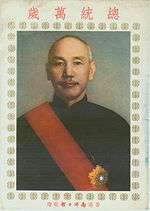Propaganda in the Republic of China
Propaganda has been an important tool of the Republic of China government since its inception in 1912. The term xuanchuan (Chinese: 宣傳 "propaganda; publicity") can have either a neutral connotation in official government contexts or a pejorative connotation in informal contexts.[1] Some xuanchuan collocations usually refer to "propaganda" (e.g., xuānchuánzhàn 宣传战 "propaganda war"), others to "publicity" (xuānchuán méijiè 宣傳媒介 "mass media; means of publicity"), and still others are ambiguous (xuānchuányuán 宣传员 "propagandist; publicist").[2] It also was an important tool in legitimizing the Kuomintang controlled Republic of China government that retreated from Mainland China to Taiwan in 1949.

1912-1949
Because the national government of this time was weak, it was difficult for any censorship or propagandistic measures to be carried out effectively. However, a bureau was set up to control the production and release of film in China. Also, newspapers unfavorable to the central government could be harassed at will. After the Northern Expedition, the power of the central government increased significantly, and propaganda campaigns became more effective. Propaganda during the Chinese Civil War was directed against the Communists and the Japanese.[3]
1949-1996
Chinese patriotic songs
See also
- Cinema of China
- Propaganda in the People's Republic of China
- Voice of Free China
References
- Kingsley Edney (2014), The Globalization of Chinese Propaganda: International Power and Domestic Political Cohesion, Palgrave Macmillan, pp. 22, 195.
- Translations from John DeFrancis, ed. (2003), ABC Chinese-English Comprehensive Dictionary, University of Hawaii Press, p. 1087.
- Shuge Wei. News under fire: China's propaganda against Japan in the English-Language Press, 1928-1941. ISBN 9789888390618. OCLC 1039082220.